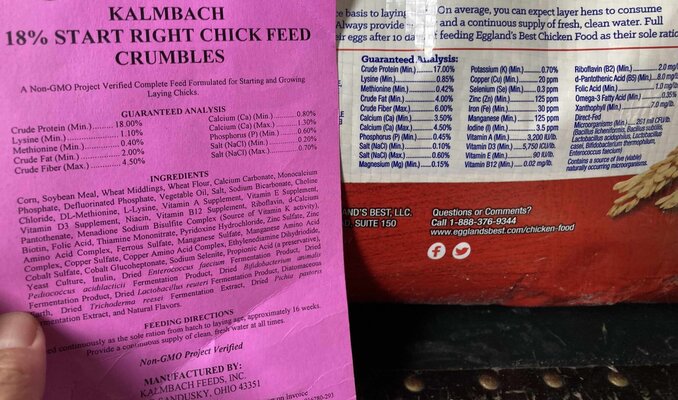Fluffyhenkeeper
In the Brooder
- Apr 3, 2022
- 38
- 43
- 46
Hi group!
I am pretty new to keeping chickens, I got my first flock 2 years ago but have been researching and dreaming of chickens for many years before that. When we finally moved to a place where we could have them I got right to work building my coop. I’ve loved having my hens they have brought me immense joy and I spend time with them everyday. My problem is it seems like I am having more deaths then I should be and more weird issues. I was hoping I could share my coop and chicken management with the group here and if anyone sees anything I could add or do differently or perhaps my problems are more genetic? I would greatly appreciate any advice, I’m heartbroken about loosing my hens. I decided the post up into chunks of what I’m currently doing and some past history:
The flock:
I started my flock off with 6 chicks from a mail order hatchery that vaccinated them and was one of the most reputable hatcheries I could find. One ended up being a rooster, and the rest were hens. One of the hens I quickly discovered was a scissor beak, so I fed her moist food when she could no longer feed on food, she lived to be 8 months old and was the sweetest hen, but I think she finally succumbed to her deformity she had an extreme crossbeak. One of my Rhode Island reds passed away a few weeks ago and I’m not entirely sure why, but I was treating her for sourcrop so that could have been the issue. It started when I was away for a couple days for work.
I had another hen pass away yesterday while I was out of town for the day. (When I’m out of town for more than a night I have someone stop by and check on them) I was actively treating her foot for bumble, she is prone to them and the vet said I did a good job treating it last time. This time her bumble was small and I was working on treating it. She seemed totally fine, healthy, laying eggs, doing her normal thing and then she passed away the next day while I was away, it was very sudden and no signs of trauma.
Medication and supplements:
As a preventative after my Rhode Island hen passed away it was suggested I deworm them, so I recently started them on valbazen drench a little less than 1/2cc for each hen and the rooster. I don’t administer any other medication. I provide grit and free range oyster shells.
Feeding:
They are fed using grandpa treadle feeders to keep out mice and rats. We’ve only had one mouse issue this past winter when it was super cold out but they were quickly removed. I feed them layer crumbles.
Water:
Both the rooster and hens receive fresh water twice a week or so and have never run out. They have nipple waters to keep water fresh. When it’s hot or they are stressed I give them chicken electrolytes in their water.
Treats:
I give them fresh treats daily, maybe a small hand full of strawberries or blueberries or some cabbage on a string. I also fill their treat roller with dried black soldier fly larva once a week. They always come running up to the door when they see me.
Coop:
I actually have two coops connected together. One of them is 3x3 feet with attached run and houses the rooster. The hen house is 4x4’ with a 4’x16’ covered run. The run has sand and is cleaned daily and I occasionally add new sand. The inside of the coop is deep litter pine shavings and is added to weekly and a total clean out happens twice a year, I have had no issues with smell or flies doing it this way. I use chicken only shoes to clean and visit the coop, I keep them in a bucket outside their run. They have a dust bath area with sand and diatomaceous earth. I don’t free range the hens as we have extreme predators, it’s not uncommon to see eagles, hawks, great horned owls sitting and waiting at dusk, we also have coyotes, cougars and occasionally bears.
Thank you in advance for any help and guidance, I’m so bummed out loosing my hens and want to learn if I’m doing something wrong. I would also like to get 4 more pullets this year, I’m thinking of giving heritage chickens a try this time as I’ve read they have less genetic issues. Does anyone have thoughts on that?
Thanks so much!!
I am pretty new to keeping chickens, I got my first flock 2 years ago but have been researching and dreaming of chickens for many years before that. When we finally moved to a place where we could have them I got right to work building my coop. I’ve loved having my hens they have brought me immense joy and I spend time with them everyday. My problem is it seems like I am having more deaths then I should be and more weird issues. I was hoping I could share my coop and chicken management with the group here and if anyone sees anything I could add or do differently or perhaps my problems are more genetic? I would greatly appreciate any advice, I’m heartbroken about loosing my hens. I decided the post up into chunks of what I’m currently doing and some past history:
The flock:
I started my flock off with 6 chicks from a mail order hatchery that vaccinated them and was one of the most reputable hatcheries I could find. One ended up being a rooster, and the rest were hens. One of the hens I quickly discovered was a scissor beak, so I fed her moist food when she could no longer feed on food, she lived to be 8 months old and was the sweetest hen, but I think she finally succumbed to her deformity she had an extreme crossbeak. One of my Rhode Island reds passed away a few weeks ago and I’m not entirely sure why, but I was treating her for sourcrop so that could have been the issue. It started when I was away for a couple days for work.
I had another hen pass away yesterday while I was out of town for the day. (When I’m out of town for more than a night I have someone stop by and check on them) I was actively treating her foot for bumble, she is prone to them and the vet said I did a good job treating it last time. This time her bumble was small and I was working on treating it. She seemed totally fine, healthy, laying eggs, doing her normal thing and then she passed away the next day while I was away, it was very sudden and no signs of trauma.
Medication and supplements:
As a preventative after my Rhode Island hen passed away it was suggested I deworm them, so I recently started them on valbazen drench a little less than 1/2cc for each hen and the rooster. I don’t administer any other medication. I provide grit and free range oyster shells.
Feeding:
They are fed using grandpa treadle feeders to keep out mice and rats. We’ve only had one mouse issue this past winter when it was super cold out but they were quickly removed. I feed them layer crumbles.
Water:
Both the rooster and hens receive fresh water twice a week or so and have never run out. They have nipple waters to keep water fresh. When it’s hot or they are stressed I give them chicken electrolytes in their water.
Treats:
I give them fresh treats daily, maybe a small hand full of strawberries or blueberries or some cabbage on a string. I also fill their treat roller with dried black soldier fly larva once a week. They always come running up to the door when they see me.
Coop:
I actually have two coops connected together. One of them is 3x3 feet with attached run and houses the rooster. The hen house is 4x4’ with a 4’x16’ covered run. The run has sand and is cleaned daily and I occasionally add new sand. The inside of the coop is deep litter pine shavings and is added to weekly and a total clean out happens twice a year, I have had no issues with smell or flies doing it this way. I use chicken only shoes to clean and visit the coop, I keep them in a bucket outside their run. They have a dust bath area with sand and diatomaceous earth. I don’t free range the hens as we have extreme predators, it’s not uncommon to see eagles, hawks, great horned owls sitting and waiting at dusk, we also have coyotes, cougars and occasionally bears.
Thank you in advance for any help and guidance, I’m so bummed out loosing my hens and want to learn if I’m doing something wrong. I would also like to get 4 more pullets this year, I’m thinking of giving heritage chickens a try this time as I’ve read they have less genetic issues. Does anyone have thoughts on that?
Thanks so much!!
Attachments
-
 5CCD6700-9B4E-4BA8-AC12-88B619A880BC.jpeg674.8 KB · Views: 83
5CCD6700-9B4E-4BA8-AC12-88B619A880BC.jpeg674.8 KB · Views: 83 -
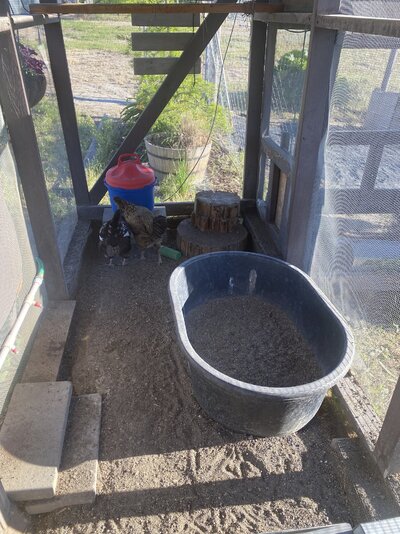 AE44EE4D-5225-4923-B12D-8F19517B3187.jpeg939.5 KB · Views: 33
AE44EE4D-5225-4923-B12D-8F19517B3187.jpeg939.5 KB · Views: 33 -
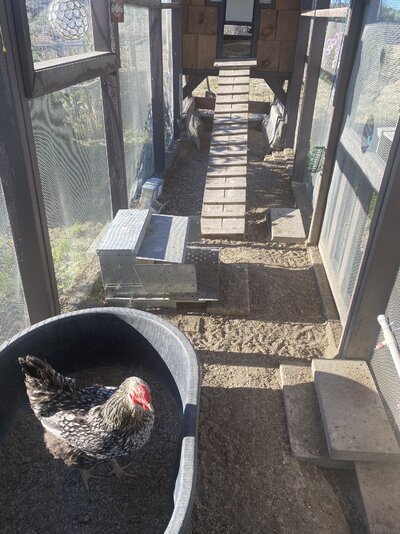 7F84D2D8-9128-4185-8418-C76BBA248E56.jpeg867.7 KB · Views: 32
7F84D2D8-9128-4185-8418-C76BBA248E56.jpeg867.7 KB · Views: 32 -
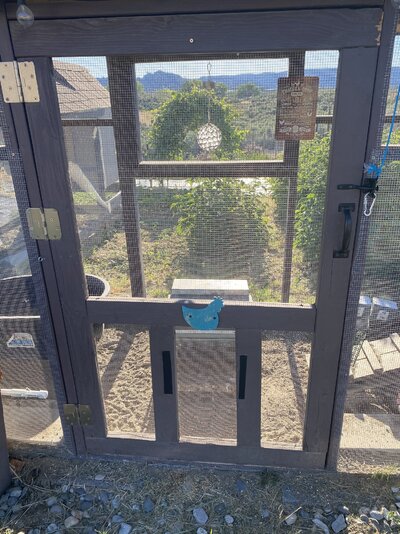 FB7413EF-890E-4185-92C3-8ACD553AA64E.jpeg981.9 KB · Views: 37
FB7413EF-890E-4185-92C3-8ACD553AA64E.jpeg981.9 KB · Views: 37 -
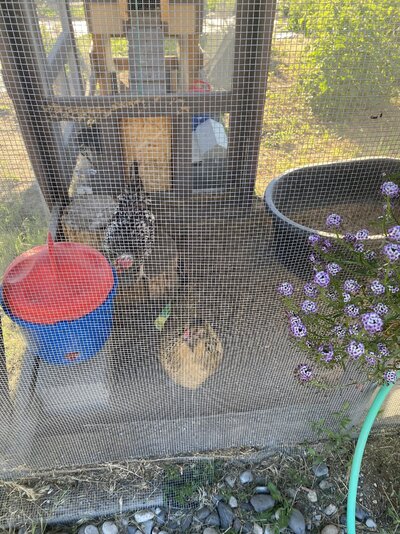 ABFC3EDB-D57E-4969-8B92-C53957AAA039.jpeg1.1 MB · Views: 36
ABFC3EDB-D57E-4969-8B92-C53957AAA039.jpeg1.1 MB · Views: 36






 .. Rest of the flock did not get infected,, so I was very relieved.
.. Rest of the flock did not get infected,, so I was very relieved. 


